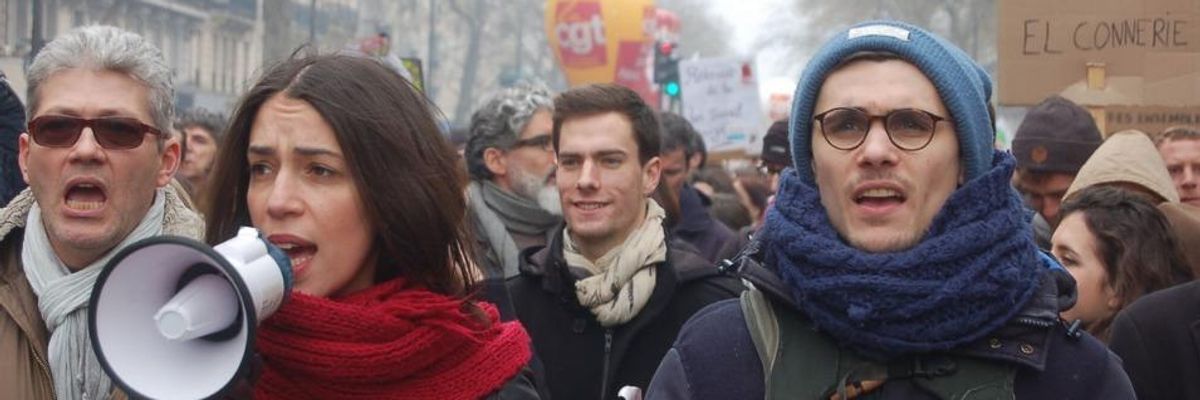Over the last two month France has been rocked by mass protests, occupations and strikes, as a new generation takes to the streets to expresses its rage at labor reforms and growing inequality. Over a million people have mobilized across the country to say on vaut mieux que ca -- "we are worth more than this."
Similar to the Occupy Wall Street, Indignados and the Gezi Park movements, #Nuitdebout ("Night on our Feet") is part of a new global movement that seeks to challenge the rule of the 1 percent by taking back public space. Thousands gather every night in Place de la Republique to discuss and debate how to construct a more participatory form of politics.
The streets and squares of Paris are alive with democracy, and if the Spanish and US examples are anything to go by, this participatory and chaotic movement could play an important part in creating transformative change.
The link between these movements is clear. On May 15th they jointly organized #GlobalDebout - over 300 actions across the world demanding real democracy, economic justice and sustainability. There were major demonstrations in Madrid, a general assembly in Mexico, a free orchestra in Brussels and occupations across Italy.
System Change
One commonality of these social movements for 'real democracy', whether in Turkey or Tunisia is that while they start as protests against the destruction of a park or police violence, they quickly become about much more. They manifest a commonly held feeling that something has gone profoundly wrong with the political system.
"[These mass demonstrations] manifest a commonly held feeling that something has gone profoundly wrong with the political system."
After 30 years of neoliberal policies, unemployment in France sits around 10%. The French government's big plan address this problem, destroying communities across the country, is more of the same. They propose a new labour reform that will make it easier for companies to fire staff and reduce payouts to laid-off employees, and it threatens the 35-hour workweek.
A group of young activists outraged at yet another backwards policy launched, "A Call to Action on March 9", started a collective, and organized a Facebook event that drew thousands of supporters. A petition against the Labor Law drew 1,000,000 signatures, and group of YouTubers created a viral video #OnVautMieuxQueCa. Local unions first responded to the call to mobilize and were then joined by some of the larger national trade unions
Yet the protest movement quickly became about more than just one law, it became a rejection of the neoliberal system that regards profit as the main goal and purpose of human society. A system that believes 'the market' should govern every action, that poverty drives efficiency and environmental destruction is necessary.
Engaging a new generation in political action
On March 31st, over 1.2 million people took to the streets across France in a massive strike against the new labour law. And this time protestors decided not to go home. This was the beginning of #Nuitdebout (Night on our Feet). The occupation has now continued for a month, and engaged a new generation in politics.
The beauty of the square occupation model is that it enables people to express themselves in myriad ways. At #nuitdebout there is a television station, endless political debates, direct action protest, free food and live music - all run by the participants.
Centered around participatory decision-making structures and the belief that people should have a much greater say in democratic processes, it reaches out to people who have never been involved in politics before. This process can be transformational on both a personal and collective level.
In Spain, the 6 million people who took part in the Indignados movement in 2011 didn't stop after they left the square. Many continued their fight for social change and went on to start innovative online sharing websites and stop housing evictions. Some even established a new political party that now governs the city of Barcelona.
Changing the debate
By retaking public space for debate, Nuitdebout and other similar social movements have been able to recapture the public imagination and burst the bubble of the status quo.
This is important because we are constantly told that quality health care, free education and even solving climate change are unaffordable, irresponsible or impossible. So all pervasive is this narrative that many seem to believe it is more 'realistic' to adapt to catastrophic climate change rather change the economic system.
This is false. It is rather a matter of the choices we as a society choose to make, and what we choose to value. For example the wealth of the richest 782 people could power half the world with 100% renewable energy. Yet our governments choose to delay action, and subsidies the fossil business.
The battle of ideas is important not only determine what is possible, but what becomes policies and laws. The Occupy Walls Street slogan, 'We are the 99%', is now know in every corner of the United States, and is being promoted by someone who has a small, but very real, chance of being the next president of the country.
By engaging a new generation in politics, and changing the debate this global movement for real democracy is an important part of political transformation. It is hard to predict what the future will hold for Nuitdebout, but for now it continues to grow across France and has just launched an international campaign against corporations who violate human rights.
